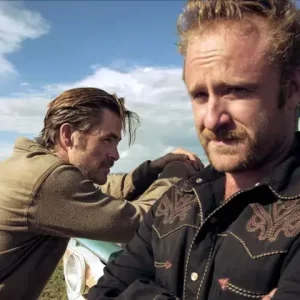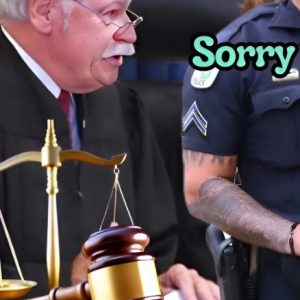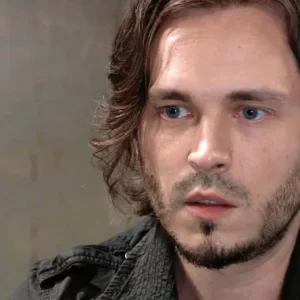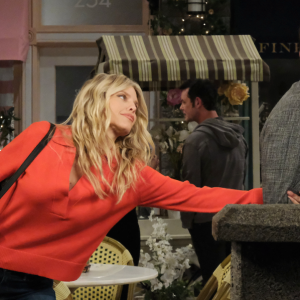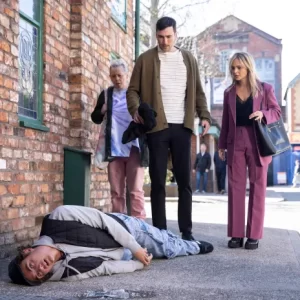EastEnders has always known how to deliver emotionally devastating moments, and few are as unforgettable as the funerals and eulogies that have brought Albert Square to a standstill. These scenes don’t just mark the passing of beloved characters—they remind us of love, regret, loyalty, and the raw grief that comes with letting go. This tribute reflects some of the most soul-stirring funeral scenes in EastEnders history—moments that have defined characters and reshaped families forever.
It began with a symbolic carriage ride, reminiscent of the one Pat and Frank had when they were married. The same carriage was used again, evoking a bittersweet memory of happier times. Applause erupted gently from the crowd, a rare moment of unity as old friends and neighbors gathered to say farewell to one of their own.
Dot Branning’s voice trembled as she stood before the mourners. “You can grieve for him,” she said quietly. “But I did my grieving for Frank a long time ago.” Her words hit hard, revealing the complex layers of love, anger, and closure that time sometimes brings. Every funeral, she confessed, took her back to burying her own parents—those wounds never truly healed.
Bianca’s absence was noted—perhaps she had gone directly to the crematorium. It didn’t feel real that he was truly gone. “It only seems like two minutes ago that you were getting married right here in the Square,” one mourner said. In reality, nearly 20 years had passed, but time felt warped by the weight of grief.
They stood in silence as a voice read the timeless words: “Earth to earth, ashes to ashes, dust to dust…” The mood turned somber as the community listened to the prayer, reminding them of resurrection, of life beyond death. But the loss in that moment was heavy. The love, the mistakes, the laughter—all now memories etched into the walls of Albert Square.
“Take care of yourself, mate,” one whispered tearfully, watching the coffin descend. There was a sense of finality, a closing chapter in a book filled with triumphs and regrets.
Stacey Slater tried to speak but struggled. “Martin would have given me a kick up the backside right now, told me to speak from the heart,” she said, tears breaking her voice. But how could she when her heart was in pieces? Her children had lost the most loving father anyone could ask for. She had lost her best friend. “He saved me so many times,” she admitted. “And I wish I could’ve saved him.” 
In a touching gesture, the children had brought something from the allotment—their own small offering to honor their dad. A quiet prayer followed: “The Lord shall preserve thy going out and thy coming in from this time forth, and even forever more.”
Then came a funeral that tore the square apart.
Chrissie Watts stood silently as the church filled with whispers. Den Watts’ death was never going to pass without controversy. A speaker tried to strike balance. “I’m not going to stand here and pretend Den was a saint,” he said frankly. “But there was another side to him. Some of us saw it—and that’s why we’re here.” His words were followed by a carefully chosen Bible reading—something that said more than his own words ever could.
But tension boiled over as Peggy Mitchell interrupted the service. Eyes wide with fury, she pointed at Chrissie. “Murderer,” she declared. “Tell everyone what you did. Tell him you’re sorry.” The room froze in disbelief as the family’s darkest secret threatened to unravel right there, in front of Den’s coffin. It was raw, unfiltered, and deeply EastEnders.
Elsewhere, Felix, dressed in full drag as his alter ego Tara Misu, fulfilled his father’s dying wish. It was an unusual tribute, but one filled with love. “Our dad wanted Tara to sing his favorite song,” his brother explained. “So here she is.” As Tara sang, the family’s grief melted into pride. Laughter and tears mixed in equal measure, celebrating a life that welcomed joy and authenticity.
Later, at Avery’s funeral, his brother Mitch struggled to find the words. “Avery, you always had my back,” he recalled. Despite their estrangement, the bond of brotherhood had never fully broken. Mitch promised to protect Avery’s sons, Finley and Felix, calling them a gift Avery gave him before leaving. Then, in a bittersweet moment, they released a white bird into the sky—a pigeon, really, but in their hearts, it flew like a dove.
Another gut-wrenching moment came as a daughter tried and failed to speak about her mother. “You’re expecting me to say what a great mum she was,” she said, but choked up, unable to continue. “You weren’t there.” She walked away in pain, whispering only a soft, “I love you, Mum. Goodbye.” Sometimes, love is complicated—and funerals don’t always bring closure.
Phil Mitchell arrived at Jamie’s funeral late, still crushed by his death. Pauline lashed out at Sonia and Martin. “Your Martin killed him,” she said, her grief so thick it turned to rage. No words, no apologies could change the fact that Jamie was dead, and nothing would ever bring him back.
As the service continued, many couldn’t bring themselves to go. “I know you don’t want to go to the funeral,” a friend comforted. “But they said they can wait a bit longer.” It was the fear of finality—the idea that once you said goodbye, it was truly over. A young boy sobbed, fearing the cold earth that would soon cradle his brother. “It’s going to be cold,” he said, “and he’s going to be alone.”
Then came Sonia, clutching her heart, eyes red from crying. “I didn’t want to come,” she confessed. “Jamie was the love of my life.” She broke down imagining a world where she would never hear his voice again, never receive another one of his simple text messages filled with kisses. “We think we’ve got all the time in the world,” she whispered. “Then suddenly, we don’t.”
She recalled a verse Dot had once sent her from the Bible: “Set me as a seal upon thine heart, as a seal upon thine arm—for love is as strong as death.” That verse, like Jamie’s love, stayed with her. “I was scared today,” she admitted. “Scared of the coffin, the church, the graveyard.” But she came, because Jamie had always stood by her when she was afraid. “So here I am now for you, sweetheart—right to the end.”
She played their song, the one they had chosen for their wedding. It echoed through the church like a haunting goodbye, wrapping everyone in a shared silence of sorrow.
Finally, as the priest spoke, “By your power, Christ conquered death and entered into glory… we entrust Jamie…”, the square was reminded of what truly matters—not just how a person died, but how they lived. These funerals weren’t just endings. They were testaments to lives filled with laughter, mistakes, growth, and love.
In EastEnders, funerals are more than just rituals. They’re revelations. They bring buried emotions to the surface, force characters to confront the truth, and show us how fragile—and powerful—human connections really are. Whether it’s a song at the graveside, an interrupted eulogy, or a whispered “I love you” through tears, every goodbye leaves a lasting mark.
These are the moments that make EastEnders not just a soap, but a mirror of real life—where loss teaches us how to live, and love never really dies.

